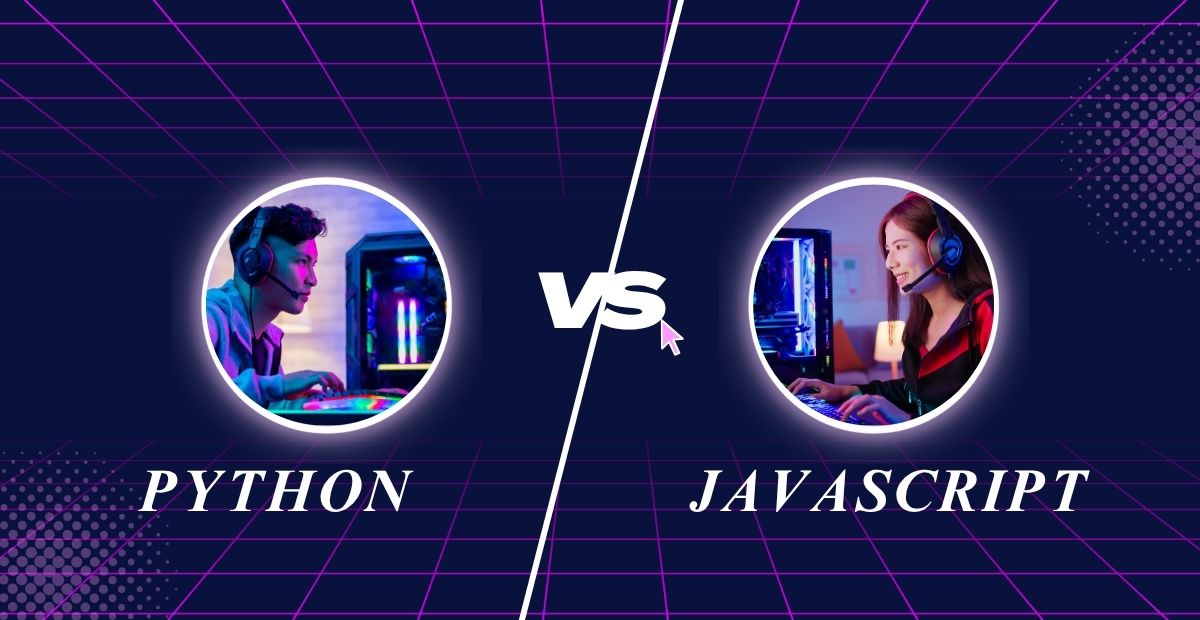Introduction
Choosing your first programming language can be overwhelming, especially with so many options available. Python and JavaScript consistently rank as the top-recommended first languages for new programmers. Both are powerful, versatile, and in high demand, but they serve different purposes.
If you’re wondering whether to learn Python or JavaScript first, this guide will break down their differences, use cases, learning curves, job prospects, and more. By the end, you’ll have a clear answer on which language aligns best with your goals.
Python vs. JavaScript: Overview
What is Python?
Python is an interpreted, dynamically typed language emphasizing human-readable syntax through consistent indentation and minimal boilerplate. Created by Guido van Rossum in 1991, it has grown into one of the most popular languages due to its clean syntax and extensive libraries. Python is widely used in scientific computing, automation, web development (Django, Flask), and artificial intelligence (TensorFlow, PyTorch). Its versatility makes it an excellent choice for beginners and experts alike.
It’s widely used in:
- Web Development (Django, Flask)
- Data Science & Machine Learning (Pandas, TensorFlow)
- Automation & Scripting
- Artificial Intelligence (AI)
- Scientific Computing
Python’s beginner-friendly syntax has made it the top choice for introductory programming courses worldwide.
What is JavaScript?
JavaScript, introduced in 1995 by Brendan Eich, is the backbone of modern web development. Initially designed to add interactivity to websites, it has evolved into a full-stack language thanks to Node.js, which allows JavaScript to run on the server side. Today, JavaScript powers dynamic web applications, mobile apps (React Native), and even desktop software (Electron). Its event-driven, non-blocking architecture makes it ideal for real-time applications like chat platforms and gaming.
Key uses include:
- Front-End Development (React, Angular, Vue.js)
- Back-End Development (Node.js)
- Mobile App Development (React Native)
- Game Development (Phaser, Three.js)
Unlike Python, JavaScript runs directly in the browser, making it essential for web development.
Python vs. JavaScript: Key Differences
Python is a general-purpose language favored for its simplicity and strong use in data-driven fields. JavaScript, meanwhile, is indispensable for web development, offering seamless integration with browsers and a robust ecosystem of front-end and back-end frameworks. While Python excels in readability and scientific computing, JavaScript provides unmatched capabilities for building interactive, real-time web applications.
| Feature | Python | JavaScript |
| Type | General-purpose, multi-paradigm | Scripting, primarily web-based |
| Syntax | Easy to read, fewer brackets | More complex, curly braces |
| Execution | Interpreted (runs server-side) | Runs in the browser & server |
| Performance | Slower due to interpretation | Faster (JIT compilation) |
| Use Cases | Data science, AI, automation | Web dev, mobile apps, games |
| Community | Large, data-focused | Massive, web-focused |
Which is Easier to Learn: Python or JavaScript
Python: Best for Beginners?
Python’s straightforward syntax and extensive documentation make it one of the easiest languages to learn. Its community is incredibly supportive, with countless tutorials, forums (like Stack Overflow), and open-source libraries.
-
- Simple Syntax – Python reads like English, making it easier for new programmers.
-
- Fewer Concepts to Grasp – No need to worry about var, let, const or semicolons
-
- Great for Fundamentals – Ideal for learning programming logic before diving into complex syntax.
JavaScript: Slightly Steeper Learning Curve
JavaScript’s asynchronous programming model and evolving standards (ES6+) can be challenging for beginners. However, its vast ecosystem and active community (npm, GitHub) provide ample resources for learning.
-
- More Syntax Rules – Requires understanding of curly braces, semicolons, and variable declarations.
- Asynchronous Programming – Concepts like callbacks and promises can be tricky for beginners.
- Browser Quirks – Different browsers may interpret JavaScript slightly differently.
Note: If you’re a complete beginner, Python is easier to learn. However, if you’re interested in web development, JavaScript is unavoidable.
Job Market & Salary Comparison
Python Job Opportunities
Python developers are in high demand, particularly in data science, AI, and backend roles. The average salary in the U.S. ranges from $110,000 to $150,000, with senior machine learning engineers earning even more. Companies like Google, NASA, and Netflix rely heavily on Python for data analysis and automation.
-
- Data Scientist ($120K – $150K)
-
- Machine Learning Engineer ($130K – $160K)
-
- Back-End Developer ($100K – $140K)
-
- Automation Engineer ($90K – $130K)
JavaScript Job Opportunities
As the only language that runs natively in browsers, JavaScript maintains its critical role in front-end development. The average salary for JavaScript developers in the U.S. is between $90,000 and $130,000, with full-stack and React specialists commanding higher pay. Tech giants like Facebook, Amazon, and Airbnb prioritize JavaScript for their web applications.
-
- Front-End Developer ($90K – $130K)
-
- Full-Stack Developer ($110K – $150K)
-
- Node.js Developer ($100K – $140K)
-
- React/Angular Developer ($95K – $135K)
Note: Both languages offer high-paying jobs, but Python dominates in AI and data science, while JavaScript leads in web development.
Python vs. JavaScript: Which Should You Learn First?
Learn Python First If You Want To:
-
- Build a strong programming foundation
- Work in data science, AI, or automation
- Prefer a language with simple syntax
- Focus on back-end development (Django/Flask)
Learn JavaScript First If You Want To:
-
- Become a front-end or full-stack developer
- Build interactive websites and web apps
- Work with React, Angular, or Node.js
- Get into mobile app development (React Native)
Can You Learn Both Python and JavaScript?
Absolutely! Many developers learn both:
-
- Start with Python to grasp programming basics.
-
- Then learn JavaScript for web development.
-
- Combine them (e.g., Python for back-end + JavaScript for front-end).
Conclusion: Python or JavaScript?
| Choose Python if | Choose JavaScript if |
| You’re a complete beginner | You want to build websites |
| You love data/AI/automation | You enjoy front-end dev |
| You prefer simple syntax | You plan to learn Node.js |
FAQs: Python vs. JavaScript
Is Python easier than JavaScript for beginners??
Can Python fully replace JavaScript in front-end web development?
Back-end (server): Yes! Python (with Django/Flask) and JavaScript (with Node.js) are both popular for server-side development.
Which has better job opportunities: Python or JavaScript?
Python: Dominates in data science, AI, and automation (higher salaries in these fields).
JavaScript: Essential for web development (more job openings overall).
Should I learn both Python and JavaScript?
Use JavaScript for front-end (React, Vue) + Python for back-end (Django).
Example: A data scientist might use Python for analysis and JavaScript to visualize results on a website.
How long does it take to learn Python vs. JavaScript?
JavaScript basics: ~3–4 months (extra time for DOM manipulation, async programming).
Which pays more: Python or JavaScript developers?
Python: AI/ML engineers ($130K–$180K) often outearn web devs.
JavaScript: Senior full-stack developers ($120K–$160K) are highly paid.
Is Python or JavaScript better for mobile app development?
Python: Possible but less common (e.g., Kivy, BeeWare)—JavaScript tools are more mature.
Which language is faster: Python or JavaScript?
Do I need to learn HTML/CSS before JavaScript?
Which has better libraries: Python or JavaScript?
JavaScript: Best for web apps (React, Express) and gaming (Three.js).





